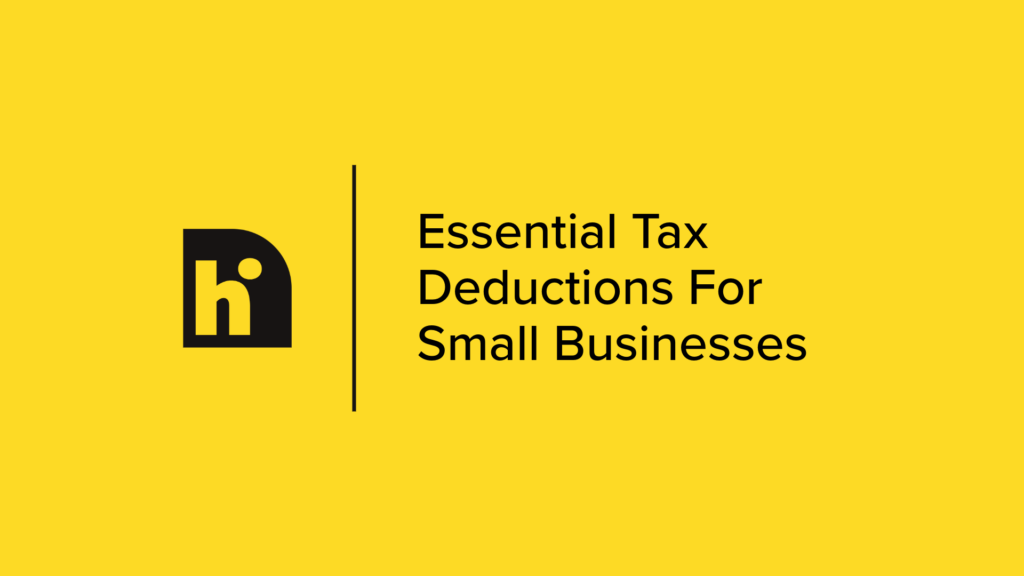22 Essential Tax Deductions for Small Businesses
Written by Sarah Dillon | Published: March 5, 2024
Sign up for our newsletter to receive everything from accounting advice to notifications on new tax laws.

Taking advantage of tax deductions for small businesses is one of the best ways to reduce your taxable income for the year. Use this guide to brush up on the most common tax deductions available to small businesses and reduce your tax liability this year.
If you need some help maximizing your business tax return, get in touch with our team.
Hiline gives you a dedicated bookkeeping and accounting team to get your taxes filed, and we’re pros at graduating companies from reactive accounting to CFO services and strategic financial advisory that drive serious long-term growth.
Key Takeaways
- Understanding and utilizing small business tax deductions can significantly minimize tax liability and include expenses such as home office costs, professional fees, rent, office supplies, utilities, and travel.
- Detailed recordkeeping is essential for claiming deductions correctly, especially for mixed-use expenses (such as business meals), car and auto expenses, and insurance premiums.
- Specific deductions such as the Section 179 deduction for equipment and immediate write-offs, as well as deductions for employee compensation, contractor labor, advertising, and education, can help lower taxable income and support business growth.
What is a tax deduction?
A tax deduction, also known as a tax write-off, is an eligible expense that can be deducted from your taxable income. The cost of a tax deduction is subtracted from your annual taxable income, effectively reducing your (or your business’s) taxable income for the year. This is how tax write-offs can help you to pay a smaller tax bill. The more tax deductions you claim, the lower your taxable income, the less taxes you pay overall.
List of Tax Deductions for Small Businesses
Advertising and Marketing
Promotion, promotion, promotion. Anything you spend on marketing your business typically qualifies as a tax deduction for small business. Anything from an online advertising campaign to SWAG, billboards, marketing material printing costs, or hiring a freelance designer to help you create a logo falls into this category. You just need to be able to prove that the promotional activities and costs are directly related to your business.
Auto-Related Expenses
If you use a vehicle for business purposes, then you’re in luck. Business-related auto expenses are tax deductible. But learn the rules before you add any car expenses to your tax return.
If you use a vehicle solely for business purposes, then you can deduct the entire cost of operating that vehicle as a business expense. However, if you use a vehicle for both business and personal purposes, you can only deduct the auto costs associated with business-related usage.
There are two methods for deducting vehicle expenses. Work with your CPA to decide which one gives you the bigger tax break (and know that you cannot switch from the actual expense method to the standard mileage method on the same vehicle).
- The Standard Mileage Rate. Multiply the miles driven for business during the year by a standard mileage rate. For miles driven in 2023, it is $0.655 per mile.
- Actual expense method. Using this method requires you to track all of the costs of operating the vehicle for the year—gas, repairs, tires, maintenance, insurance, registration fees, and more. Then, multiply those expenses by the percentage of miles the car was driven for business.
Because both methods require you to track your business mileage, we recommend using a mileage app to take care of this task. If you decide to DIY this task with a pen and paper, remember to keep a detailed log of your business miles that documents total miles driven, time and place of each trip, and business purpose of your trips.
Finally, you can’t count the miles driven while commuting between your home and your regular place of business as deductible costs as they are considered personal commuting expenses.
Bank fees and merchant fees
Similarly, if your bank or credit card company charges your business fees—annual fees, transfer fees, monthly service charges, overdraft fees—these are also fully deductible. And also deduct merchant or transaction fees paid to a third-party payment processor (e.g. PayPal or Stripe).
Business Meals
If you take clients out for meals, the cost is typically tax deductible business expense. The cost of business meals with clients is only 50% deductible. Other types of meals, like an office party meal, are 100% deductible. The rules governing this deduction have changed several times in the past few years, so save your receipts—note the business purpose of the meal—and ask your CPA and bookkeeping team to correctly categorize and claim this tax deduction on your return.
Charitable Donations
If your business makes a charitable donation to a qualifying organization, you can claim that as a tax deduction. How to claim charitable donations depends entirely on your business structure. For example, owners of sole proprietorships, LLCs, and partnerships need to declare charitable donations on their personal tax returns, whereas corporations would claim this deduction on a corporate tax return.
Employee Gifts
You can claim 100% of the cost of employee gifts, but the maximum limit is $25 per employee per tax year.
Employee Salaries and Benefits
Employee wages, bonuses, and commissions are generally fully deductible. One thing to note: sole proprietors, partners, and LLC members can’t claim this deduction, because these individuals are not classified as employees.
Similarly, you can deduct some employee benefit programs—dependent care assistance, education assistance, qualified retirement plan accounts, and life insurance adoption assistance. Self-employed individuals can claim contributions to their own retirement plans as personal deductions on Form 1040.
Equipment and Machinery
Does your business lease equipment or machinery—printers, copiers, even heavy machinery? If so, you can fully deduct these lease costs. If you buy the equipment outright, you can claim depreciation on equipment and machinery. However, these costs must be deducted over several years with a Section 179 deduction.
Home Office Expenses
If you use a home office for your business, you may be able to use the home office deduction to claim a portion of your housing expenses as a deductible business expense. It doesn’t matter if you rent or own your home. And any type of residence can qualify for the home office deduction—condos, single-family homes, freestanding studios, and more.
However, to be eligible for the home office deduction, the following criteria must be met.
- Regular and exclusive use. You need to use your home office regularly and it has to be used exclusively for business. This means that a dining room with a standing desk won’t count because the allocated home office space in your home isn’t used exclusively for business purposes.
- Principal place of business. A home office also needs to be the primary location for your business activities. Of course you can also do business outside your home—your home office just needs to be the primary base for operations. For example, let’s say you mostly work at home but head out to a nearby cafe for client meetings. You can still claim home-office expenses for the part of your home that’s used exclusively for business reasons.
There are two ways to deduct home office expenses.
- Simplified method. This method allows you to deduct $5 per square foot of your home that’s used for business up to a maximum of 300 square feet.
- Standard method. Using this method, you need to track all of the actual expenses related to maintaining your home—rent, mortgage interest, any utility bills, even housekeeping and landscaping services, repair costs, and more. Then, multiply these expenses by the percentage of your home that’s devoted to business use to calculate your total home office deduction.
The IRS tends to scrutinize the home office deduction more than other tax write-offs, so ask your accountant to decide which method is the most advantageous to your situation and make sure you’re claiming these expenses correctly.
Independent Contractor Fees
If you hire freelancers and independent contractors to help with your business, their fees are fully tax deductible. Remember: you need to issue a Form 1099-NEC to any contract worker you paid $600 or more during the tax year. If you’re paying the contractor with a business credit card or PayPal, then the payment processor must issue the worker a Form 1099-K.
Insurance
The premiums you pay for business insurance are fully deductible. Examples include:
- Liability coverage
- Professional liability and malpractice insurance
- Workers compensation coverage
- Property coverage
- Group health, dental and vision insurance for employees
- Auto insurance for any business vehicles
- Business interruption insurance
- Life insurance that covers employees (provided the business or business owner is not a beneficiary on the policy)
Interest
When you take out a small-business loan, you’ll need to pay interest on that loan to a lender. Thankfully, interest on business loans is usually fully tax deductible provided the loan is being used for business expenses and purposes.
To claim this deduction , the business owner must be legally liable for the debt, and the business owner and the lender must have a “debtor/creditor” relationship. In other words, the loan must be through a traditional lender, and not a friend or family member.
Inventory (Cost of Goods Sold)
If you run an inventory-based business that purchases products for resale or manufactures products of its own, you can deduct the cost of the goods you sell (aka your “inventory”). Generally, you need to value inventory at the beginning and end of each tax year to determine your cost of goods sold.
Memberships and Subscriptions
The cost of any professional memberships and subscriptions you require to run and grow your business is tax deductible.
Office Furniture
Office furniture is generally seen as office supplies, and can, therefore, be deducted just as you would deduct printer paper or cleaning products. High-ticket items may need to be depreciated.
Office Supplies
Printer paper, envelopes, pens, notepads—office supplies might be inexpensive, but the total cost can add up over the calendar year. Thankfully office supplies are fully deductible.
Professional Services
Most businesses hire a lawyer, an accountant, a bookkeeper, and other professionals, Provided these professionals are hired for business purposes, then their fees are fully deductible. Examples of this deduction include the fees charged by your CPA, tax preparation fees, or the fees you pay to work with an online accounting service like Hiline.
Shipping Costs and Postage
Shipping and postage costs can add up during the tax year. Keep track of this expenditure because these costs are fully deductible provided they are business-related.
Software Subscriptions
It’s rare that a business doesn’t use software in today’s digital world. So if you’ve purchased software outright or paid for a software subscription, the cost qualifies as a business tax deduction.
Startup Costs
Business startup costs are technically seen as a capital expense by the IRS (i.e. they are not considered a tax deduction) since they are an investment in your business. And deductions for capital expenses are typically amortized over several years.
The most important thing for you to remember here is: if your business incurred startup costs this year, they could help you reduce your tax bill, so ask your CPA to figure out how
Taxes and Licenses
You can deduct what you pay in business taxes and business licensing fees. Some example here include:
- Payroll tax
- Sales tax
- State income taxes
- Real estate taxes paid on business property
- Excise taxes
- Fuel taxes
- Business licenses
Travel Expenses
If you travel for business, save those receipts. Business travel costs are deductible as long as they occur away from the city or area in which you conduct business (aka your “tax home”). You must also be away from your tax home for longer than a full workday. Examples of deductible business travel expenses include airfare, tolls, taxis, lodging, and more.
Utilities
Business-related utility costs are fully deductible. Examples include the water bill and electricity bill from your business location(s), or even your cell phone plans.
One thing to note: If you have a home office and use a landline, the cost of the first landline is not deductible, but the cost of any subsequent landlines are.
How to Claim Small Business Tax Deductions
Your business structure dictates how earnings and business tax deductions are reported and claimed.
- Sole Proprietorships: Use Schedule C (Form 1040)
- LLCs & Partnerships: Use Form 1065
- Corporations: Form 1120
If you need help with your tax filing this year, get in touch with our team.
Hiline specializes in graduating businesses from reactive accounting to strategic finance that drives long-term growth. We give you a dedicated team of tech-enabled bookkeepers and tax professionals to get your books done and your taxes filed—all while maximizing your return for the year.
Frequently Asked Questions
What is the tax deduction for a startup business?
You can claim up to $5,000 for startup costs deduction in the first year of your business. If your startup costs exceed $50,000, the deduction will be reduced.
What types of business expenses are tax-deductible?
Many types of business expenses are tax-deductible, such as home office expenses, professional fees, rent, office supplies, utilities, insurance premiums, travel and entertainment expenses, car and auto expenses, depreciation and equipment costs, employee compensation and benefits, payments to independent contractors, and advertising and marketing expenses. You may be eligible for deductions on these expenses.
Share this article
Read Similar Articles

Tax
Why Summer is the Perfect Time to Get Your Financial Ducks in a Row

Tax
What Tax Deductions Can You Claim Without Receipts?
